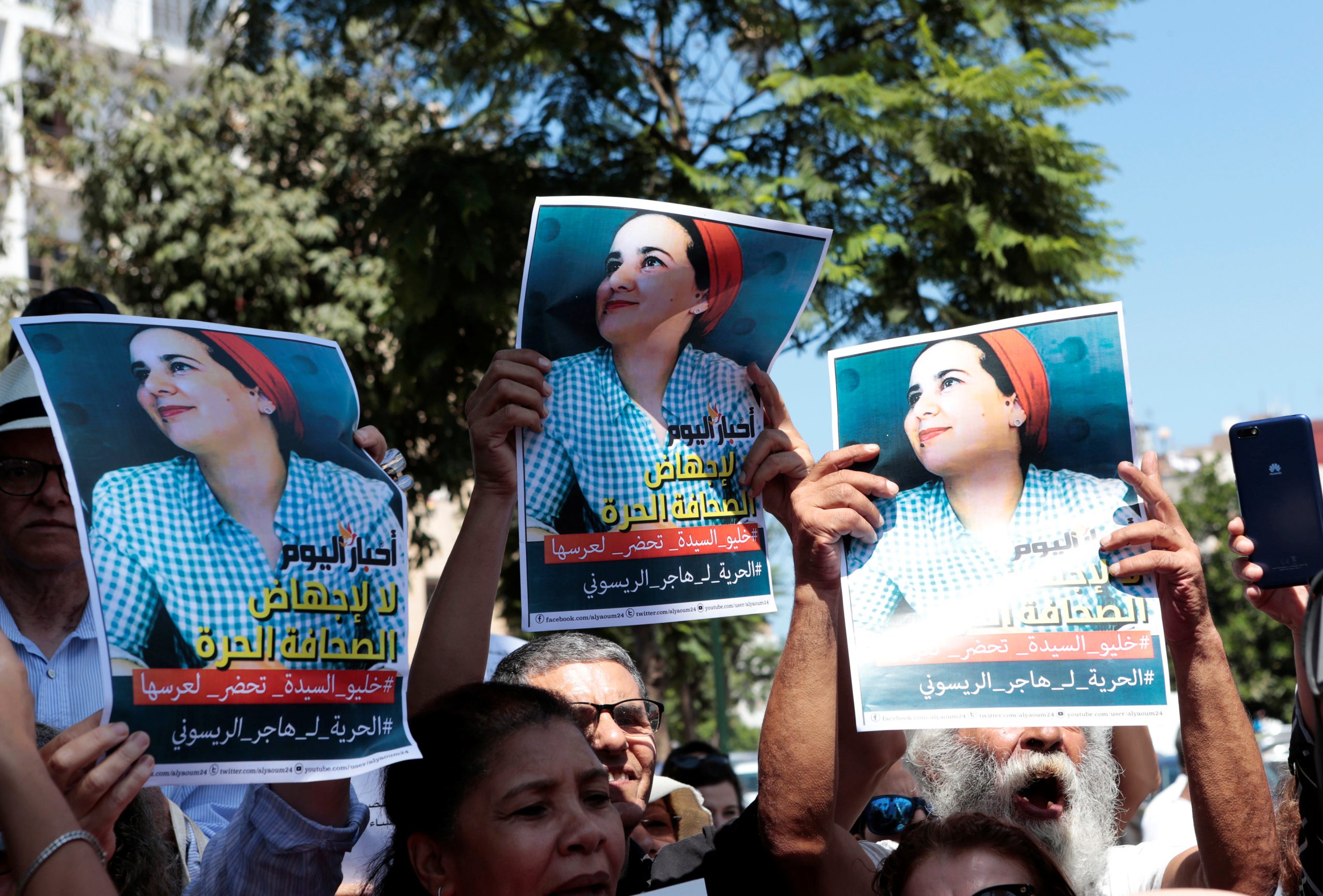The Clooney Foundation for Justice’s TrialWatch initiative monitored the trial in Morocco of journalist Hajar Raissouni and four co-defendants.
Raissouni was convicted of violating Articles 454 and 490 of the Moroccan Criminal Code, which criminalize “intentionally obtaining an abortion” and sexual relations between those not “united by marriage.” Article 453 of the Moroccan Criminal Code states that abortion is a crime unless it is necessary for the health of the woman and the woman’s husband consents.
Raissouni was put on trial along with her fiancé, her doctor, and others involved in her care – all were convicted at a trial bearing the hallmarks of an unfair and punitive process.
Ms. Raissouni and her fiancé were sentenced to one year in prison and fined, her doctor was sentenced to two years in prison and fined, and the doctor’s assistant and anesthesiologist were given suspended sentences of eight months and fined.
Ms. Raissouni is a journalist for the Moroccan newspaper Akhbar Al Yaoum, a newspaper that, according to Ms. Raissouni’s lawyer, is “considered an opposition [paper].” Ms. Raissouni had previously covered the protest movement Al-Hirak al-Shaaby. On August 31, 2019, Ms. Raissouni was arrested on her way out of a clinic where she had sought medical assistance for what the defense alleged was a hemorrhage. She was interrogated by the police and taken to a different hospital, where the police ordered an invasive medical examination performed without Ms. Raissouni’s consent. As her defense attorney characterized it, “[s]he was forced and coerced into having her womb searched.” She was charged on September 2, 2019 and kept in pre-trial detention until her conviction on September 30, 2019. Ms. Raissouni has said that during her detention the authorities asked her “more about [her] political writings . . . [than] the trumped-up charges.”
While prosecutions under restrictive abortion laws may in themselves violate international human rights law, Ms. Raissouni has argued that her prosecution and conviction are also a politically motivated effort to silence her work as a journalist for an opposition newspaper. As one of her defense attorneys said, “[i]f the clinic [where Raissouni allegedly underwent an abortion] sees 10-12 patients every hour, why [was only] Hajar [prosecuted]?” Other observers have also commented that it is very rare for a patient to be prosecuted for an alleged abortion.
TrialWatch monitors noted that several irregularities were raised by defense counsel, including that:
- According to defense counsel, Ms. Raissouni was not informed of her right to remain silent before questioning and she refused to sign a report of what she had allegedly told the Judicial Police. As the defense argued, “[t]here is no signature and that is mandatory to be considered viable, otherwise they can write whatever they want.” According to the defense, another defendant was given records of statements to the police in Arabic, although they spoke only French.
- The evidence did not sustain the charges. The defense asserted that blood tests revealed that the levels of pregnancy hormone in the defendant’s blood were so low that it would have been impossible for her to be eight weeks pregnant as the police’s doctor claimed. Likewise, the defense pointed out that the prosecution appeared to rely on the fact that Ms. Raissouni had looked ‘pale’ as indication that she had undergone an abortion – an observation of clearly limited evidentiary value. Further, the record of the pre-trial investigation itself indicated prejudgment of the defendant’s guilt. For instance, defense counsel argued that one report was titled “Medical Exam of Abortion,” appearing to presume the result of the inquiry.
- Finally, the defendant was subjected to a non-consensual, invasive medical examination by a medical professional the defense asserted was unregistered, implicating her right to be free from torture and cruel, inhuman, or degrading treatment.
These potential violations of the defendants’ rights under Article 14 of the ICCPR, including the right to silence, the privilege against self-incrimination, the right to interpretation, and the right to be presumed innocent, were raised by the defense but dismissed by the court.
Update as of August 13, 2020: The Fairness Report has been released.
